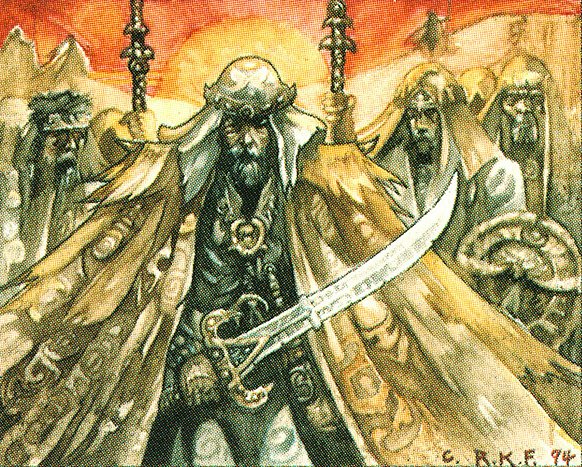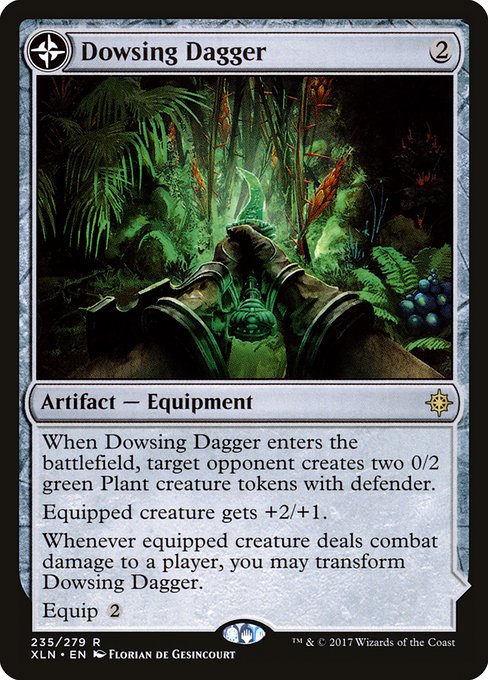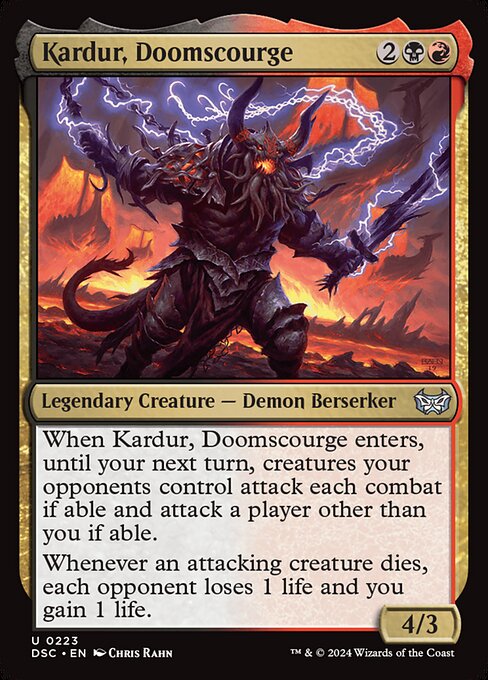Deck & Commander Strategies

Ephara, God of the Polis
A control deck that uses Ephara's ability to draw cards whenever a creature enters the battlefield to maintain card advantage, combined with counterspells and spot removal to control the board.

Kardur, Doomscourge
A goad-focused deck that forces opponents' creatures to attack others while using blink effects to maximize value from creatures and disrupt opponents' plans.

Estrid, the Masked
An enchantment tribal deck that uses enchantments to deter attacks and protect itself, aiming to survive and outlast opponents by building a defensive board state.

Hazezon Tamar
A Naya token deck centered around Hazezon's ability to create sand tokens, focusing on token generation and overwhelming the board through wide board presence.
Gameplay Insights
- 1
Ephara’s ability to draw cards off creatures entering the battlefield provided sustained card advantage, enabling consistent control responses.
- 2
Kardur’s goad mechanic forced opponents into unfavorable combat scenarios, effectively redirecting aggression and buying time.
- 3
Estrid’s defensive enchantments successfully discouraged attacks, shifting the table’s focus and allowing her to build a resilient board.
- 4
Hazezon’s sand tokens created a persistent threat that required attention, balancing token generation with board presence.
- 5
Players focused on survival and incremental advantage rather than aggressive early wins, reflecting their intent to experiment with new strategies and improve their gameplay.
Notable Cards
-

Dowsing Dagger // Lost Vale
-

Path to Exile
Gameplay Summary
The game featured a diverse four-player Commander match with Ephara, God of the Polis; Kardur, Doomscourge; Estrid, the Masked; and Hazezon Tamar.
Ephara's player piloted a control-oriented Azorius deck focusing on drawing cards through creature entries and controlling the board with spot removal and counters.
Kardur's deck leveraged a goad mechanic combined with blink effects to manipulate combat and generate advantage.
Estrid's deck revolved around enchantment tribal synergies and defensive enchantments to deter attacks and protect herself from aggression.
Hazezon Tamar focused on generating sand tokens and maintaining a board presence with Naya colors and token synergies. Early on, the table saw a slow build-up of board state as Ephara worked to maintain control with counters and removal, while Kardur sought to provoke attacks between opponents using goad.
Estrid fortified her defenses with enchantments, aiming to avoid being targeted, which shifted aggression onto other players.
Hazezon steadily deployed tokens, capitalizing on his commander’s ability to produce sand tokens and flood the battlefield.
Key turning points included Ephara’s draw engine triggering off creatures entering the battlefield and Kardur’s strategic goading to direct attacks and minimize threats.
The game’s tension revolved around managing threats and avoiding early elimination, with no single player rushing for an all-out win, reflecting their resolutions to improve and enjoy different playstyles.

















![Commander VS S5E3: ??? vs ??? vs ??? vs ??? [MTG Multiplayer] thumbnail](https://i.ytimg.com/vi/WDOyK7Idh20/sddefault.jpg)









![Commander VS: Phelddagrif VS The Big Idea VS Rarity and Roon VS Estrid [EDH] thumbnail](https://i.ytimg.com/vi/IQgv2HY2Ov8/sddefault.jpg)
![Commander VS S16E6: Akiri VS Estrid VS Izoni VS Uril [EDH] thumbnail](https://i.ytimg.com/vi/rlrtwKjcoD0/sddefault.jpg)
![Commander VS S14E5: Lord Windgrace VS Saheeli VS Aminatou VS Estrid [EDH] thumbnail](https://i.ytimg.com/vi/JC-3BaczJhU/sddefault.jpg)




![Starter Commander Decks [Commander VS 321] | Magic: the Gathering Commander Gameplay thumbnail](https://i.ytimg.com/vi/seEnqBzrpsU/sddefault.jpg)








![Commander VS S3E3: ????? vs ????? vs ????? vs ????? [MtG: Multiplayer] thumbnail](https://i.ytimg.com/vi/zUR3AeqZkPU/sddefault.jpg)








